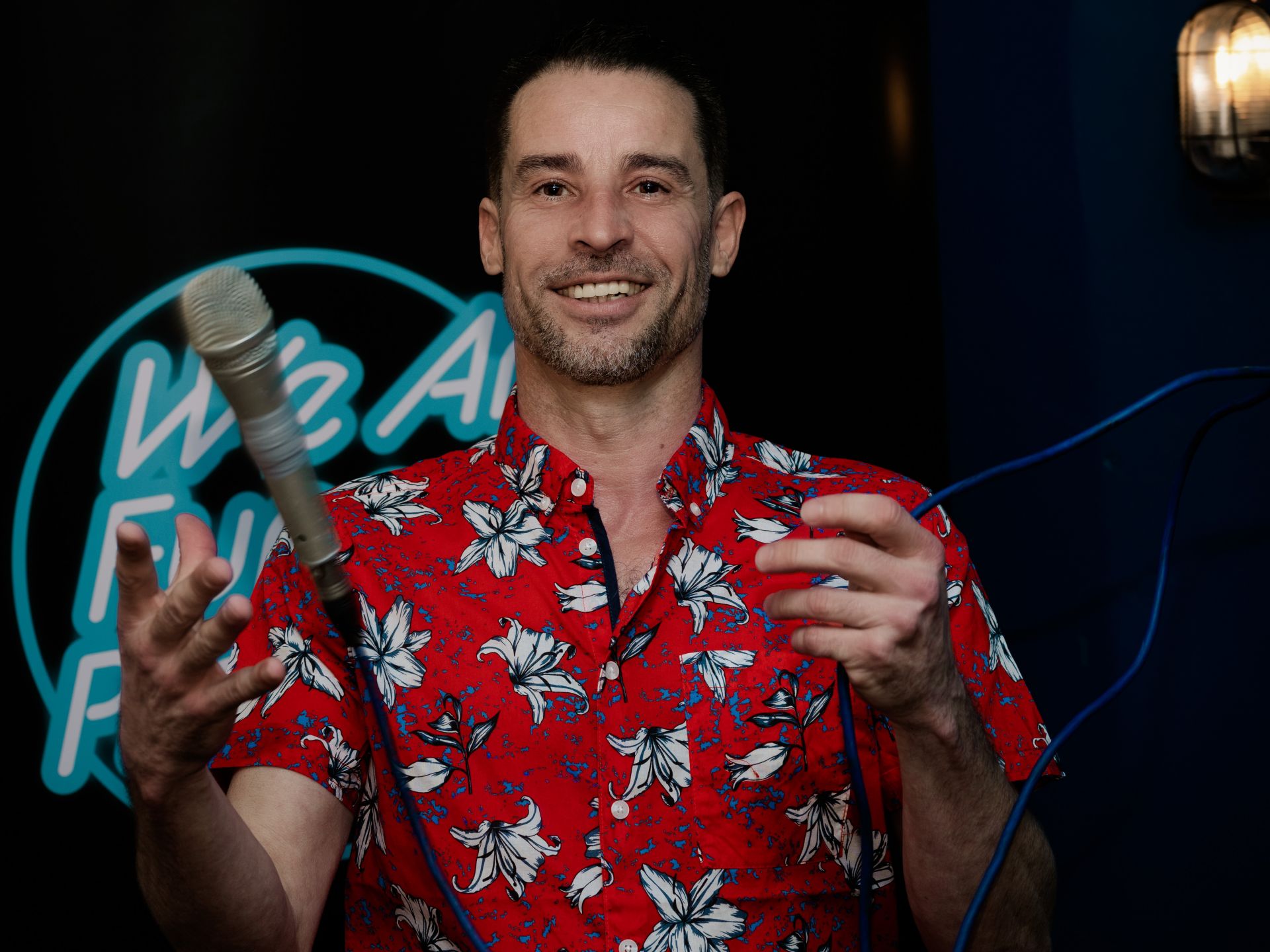Why I Treat Every Comedy Show Like a Party… And Maybe You Should Too

There’s rather a lot that goes into booking, promoting and MCing a quality open mic night. As a result, matters of production and success can get a little overwhelming at times.
Many years ago, I adopted an attitude, a touchstone for myself if you will, that has served me very well. It has also well served thousands of open mic comedians. And hundreds of professional acts. Also, tens of thousands of audience members.
The moment I feel I am becoming untethered from the mission, frustrated or feel that I am starting to miss the point, I remind myself… every show is like a party. Every show is a party.
This always gets me back to the primary directive. Make the shows fun. If the shows stop being fun then everything else falls down.
I am the person throwing the party. I
am the host. In the world of stand-up, also known as the MC. I am the
gloriously titled “Master of Ceremonies” and my work to “fight for the right to
party” begins long before the entry music kicks in and the stage lights come
up.
Let us accept that there are all kinds of parties and thus, some of my similes may falter. A Dinner party is pretty much focused on food, drink and conversation. Between a very limited number of people.
A House party may well have music and dancing as a focal feature.
A Birthday party specifically celebrates an individual. While gathering lots of people in the aim of sharing a good time.
I concede that the invitation process
is somewhat different to a Dinner, House or Birthday party. In those cases,
most times, the invitees are hand-picked, personally known and socially close
to the host. Aaah, not-so-much for an open mic booker.
For an open mic comedy gig there is an alternative 2-tier system invitation system in place. The acts. Then the audience. In exactly that order.
I will directly invite a headliner to perform and serve as the peak of the show. Sometimes, I’ll invite a couple of open mics to get on that bill before I open up to the masses. Then, I let it be known that I am inviting acts to apply for a spot on that show, that date.
On my part, there follows a casting process that is alien to Dinner, House or Birthday parties. I strive to balance the bill so a broad selection of people feature and a diverse level of experience is represented. It is not simply family and friends.
It is entirely unusual to let people know you are having a party and offer an opportunity to ask to attend. Then fail to let some of those people come on down.
Well, the performers could still come. As audience. But they won’t.
My first responsibility is to the show
itself. The “party”. The bigger picture… so everyone there has the best chance
of laughing. Or getting good laughs and everyone sharing that aforementioned “good
time”.
What then follows, once I have selected and confirmed the line-up, is a specific promotional effort. This is also counter to Dinner, House or Birthday parties. I try and let as many people know about the gig/party as possible and make it clear that everyone is invited. The more the merrier
So, having partly undermined my own premise of “a gig is a party” with an explanation of the invitation process, allow me to get my metaphor back on track.
Most clearly, entertainment is laid on… that’ll be the stand-up comedy.
There may be a celebration of an individual, for example, when I have the room applaud a first-time act for their courage to simply get up and perform. Or, when the audience needs no leading in whooping and cheering a performer that just crushed.
Hey, I’ve even been known to lead a chorus of “Happy Birthday” from the entire crowd for an individual act or audience member. Sometimes, when it was indeed their actual birthday.
I have come to learn it is ideal that I
consider everyone attending to be a “guest”. This opinion, attitude,
whatever you may wish to call it, really does meet the “party” standards test.
If an act is paying me for a stand-up skills boosting service, such as attending one of the varied live We Are Funny Project one-day workshops, or taking one of my online courses or asking for 1-2-1 comedy coaching then I consider that person to be a client and a student.
It’s a clear business transaction and a client is a different relationship dynamic from a “guest”. Which is why I always seek to provide some added value to those clients/students education. That's great for the client and simply, good business practice. It may be through extra stage time (if the student is London local). Perhaps more time than expected on a teaching session. I always keep the window open to answering follow-up emails once our sessions are completed.
Back to my point about considering those attending my shows as a “guest”. By taking this approach, each person coming to the gig is perceived in the best possible terms. It is on me to make sure the event and opportunity is as described. To be sure that I am as welcoming as can be. This is a solid attitude to get any gig/party off to the right start and create an appropriate and positive tone.
It does not matter if I am tired, or my back is hurting, or if I have had a crumby day. Once it comes time to “meet and greet” my guests, they will absolutely receive a warm welcome.
For acts, the welcome is at the “signing in”.
For audience members, the hospitality commences as I direct people to the best seats. I reassure them that “it’s not the kind of show where the acts pick on the audience”. Ultimately, it comes when I take the stage and make damned sure that everyone feels safe and included as I warm them up for a whole lotta laughter.
That’s hosting 101. In any event.
There’s the breakdown of my role as the host, party man, promoter, MC… whatever you may want to view me as. Now, your angle on being a "guest".
Dealing with lots of people
drawn to performing open mic comedy means handling a vast range of characters.
We all typically share a love of stand-up, it’s what drew us to open mic in the first place. There’s often a lot of pleasant common ground there. Most often, comedians are pretty bright and that lends itself to some wonderful sets, involving conversation in and around the gig/party.
However, the art form can also draw some stunningly self-infatuated egos, needy or brittle folk.
My “party attitude” has been extremely
helpful in allowing me to identify where the line of acceptable behaviour sits.
Specifically, from my perspective of what I expect from my “guests”.
Let’s recall that there are 2 types of
“guest”. The acts and the audience. There are differing standards for each.
For acts/guests. Just as with a Dinner, House or Birthday party, a host would not be entirely thrilled with a “guest” who arrived so late they missed a key part(s) of the event. Or even RSVPed and then simply did not show.
My welcome is not so warm if they (an act) has wangled their invitation under false pretences such as mis-representing their level of experience. Or, promising to bring 10 people and then rocking up solo.
All the same, audience “guests” do, in
my mind, have standards inflicted upon them. There is no free pass for being
rude to other guests. Shouting out, heckling, disturbing the show/party is poor
behaviour. Especially when as the host I have made it clear it is not welcome.
Like any party host it is my responsibility to manage those people for the best
interests of the group. It is partly my role to try and get inconsiderate
“guests” to toe-the-line for the best interests of all.
You would not reasonably go to a Dinner party and decline to eat as you “just had a McDonalds on the way”.
Nor would you, in good faith, got to a House party and turn off the music that masses of people are dancing to. Only to start playing your lame and undanceable new demo.
Equally, it would be a terse
response from the fellow guests to any person attending a Birthday party who
started noshing on the cake prior to the traditional sing-song and
candle-extinguishing ceremonies.
Of course, if someone is behaving badly at a party, any party, then the host reserves the right to exclude them. For an act it might mean not allowing them to take their promised place on the bill. For an audience member it could be asking them to leave. As open mic is free to enter, I can freely ask people to exit.
Thankfully, these are rare instances and the vast majority of “guests” seem to “get it” and gather for the eliciting of laughter, or, the delivery of said laughs. They have indeed come down to “share a good time”.
I ask that acts and audience (the latter are wholly unlikely to ever be reading this) to consider themselves as “guests” and to act accordingly. In return, you can anticipate being treated in that precise friendly fashion in return.
It’s a good-will pledge. Something for something. A stage. Or a show.
Then we can all focus on the “good times”.
Online classes for comedians at every level of experience
Learn and practise with the most talented comedians
Free open mic comedy, with top quality headline comedians
For stand-up comedians
For creative agency teams
Stand-up skill set. Stand-out results
Small print
Contact
We Are Funny Project Limited, 61 Bridge Street, Kington, HR5 3DJ, is registered in England and Wales, company number 08537398.
Copyright © We Are Funny Project Limited. All rights reserved.

